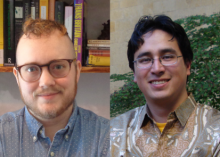History doctoral students Jorge Bayona and Adrian Kane-Galbraith, awardees of Mellon Foundation Reimagining the Humanities PhD and Reaching New Publics: Catalyzing Collaboration fellowship for the academic year 2019-2020, shared valuable observations on the teaching of transnational histories at Seattle District community colleges. Their insights are helpful to UW grad students who aspire to pursue teaching-intensive careers at two-year colleges in Washington state.
This Mellon fellowship is part of the Reimagining the Humanities Ph.D. and Reaching New Publics program launched by the Simpson Center for the Humanities in 2015. The program is designed to help UW humanities doctoral students be meaningfully connected with Seattle-area community colleges to share scholarly and pedagogical practice across disciplines and to broaden their career prospects. Applicants to the fellowship need to pair up in advance and apply jointly. Each year, six fellows are selected.
Adrian, a specialist of the British Empire and history of sexuality, and Jorge, a specialist of Southeast Asia and Latin America, are both enthusiastic about world history pedagogy in higher education. The Reaching New Publics fellowship opened up an exciting opportunity for them to look into the status of the world history curriculum at two-year colleges.
“We were walking to a grocery store when the call-for-applications email popped up on my phone,” said Jorge. “The two of us quickly decided to put together a proposal for the fellowship together, since we already had a topic in mind.” They won the fellowship.
Thanks to robust partnerships between the UW and Seattle District community colleges, the Reaching New Publics fellows have opportunities to learn about the vital role of two-year colleges by shadowing community college faculty mentors over the course of an academic year. Community colleges are critical to American high education—they “serve nearly half of all undergraduates in the United States, including fifty percent of undergraduates of color and an increasing proportion of low-income students.”
During their fellowship term, Adrian and Jorge observed lectures, attended faculty meetings, and participated in workshops with professors from three key institutions in Seattle—North Seattle College, South Seattle College, and Seattle Central College. They worked closely with two faculty mentors—Anna Hackman and Greg Hinckley from Seattle Central College. They also had the opportunity to shadow faculty at Centralia College.
Based on first-hand observations and data collection, Jorge and Adrian find that the history curriculum at two-year colleges tends to place a heavier emphasis on U.S. history than non-U.S. history. In their blog post, “What is the Future of Transnational Historians at Community Colleges?” published in March 2021, they write that faculty at Seattle District community colleges “are asked to teach U.S. history much more frequently than they teach histories of other regions.” After analyzing history curricula at 34 community and technical colleges in Washington state, they further share that “[o]f the 770 class sections with a geographic focus, 75% focused on the United States and only 25% focused on non-U.S. history.”
For history graduate students who are non-U.S. specialists, Jorge and Adrian suggest that it is an excellent idea to gain more expertise and teaching experiences in U.S. history. Choosing a minor field in U.S. history and TAing for U.S.-focused classes would be a plus. “Expertise in U.S. history appears to be highly desirable to the hiring committees at community colleges,” added Jorge.
Speaking about career tracks at community colleges, Adrian remarked that jobs and tenure systems at community colleges in the Puget Sound region could be very competitive, and require some different sets of skills than career tracks at four-year colleges. In addition to a heavy teaching load, faculty at two-year institutions are actively engaged in research, much of which is pedagogical research. “But I do like the intimate environment at community colleges,” said Adrian.
“This is a great fellowship, and it taught us a lot about career diversity,” said Jorge. With broadened visions about career prospects, history and humanities graduate students are increasingly adapting to careers at diverse institutions. Several history alumni are currently teaching at private and public high schools in the Seattle metropolitan area.
The Department of History has been closely involved in the Reimagining the Humanities Ph.D. and Reaching New Publics program since its launching in 2015. Previously, history graduate students Lily Schatz, Bradley Horst, Brendan McElmeel, and Jennifer Smith were among the awardees of the fellowships. Jessica Bachman and Katia Chaterji are the current fellows for the academic year 2021-2022.
